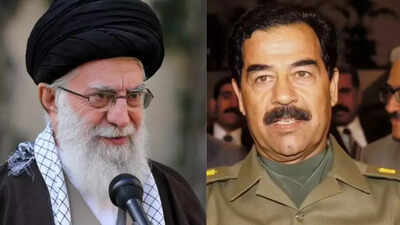ARTICLE AD BOX

Ayatollah Ali Khamenei (left) and Saddam Hussein
Israeli defence minister Israel Katz on Tuesday warned that Iran's supreme leader Ayatollah Ali Khamenei could have a "similar fate" to Iraq's former dictator Saddam Hussein."Remember what happened to the dictator in the neighbouring country of Iran who took this path against Israel," said Katz to news agency Reuters. Katz's caveat linking Khamenei's fate to Saddam Hussein could be considered a highly charged statement, reflecting the deepening hostility between the Jewish State and its arch-rival Tehran. Saddam Hussein was overthrown and executed following a US-led invasion in 2003, symbolising the total collapse of his regime. By drawing this parallel, Katz is not only issuing a personal threat to Khamenei but also hinting at the potential for regime change in Iran if its aggressive policies, particularly towards Israel, persist. The statement seems aimed at both psychological warfare and international signalling, reaffirming Israel’s resolve to confront what it perceives as existential threats. According to the Israeli government, the threat stems from the Khamenei-led state actively involved in the enrichment of uranium beyond permitted limits that could potentially make Iran a nuclear-capable nation.Invoking Saddam’s fate serves as a cautionary tale, warning Khamenei that unchecked defiance and militarism could lead to catastrophic personal and national consequences.
Saddam was known for his hostility towards Israel, particularly in the 1980s and 1990s. During the 1991 Gulf War, Saddam's forces fired Scud missiles at Israel, aiming to draw Israel into the conflict and destabilise the US-led coalition against him. Despite the provocation, Israel, under US pressure, chose not to retaliate. Saddam’s regime was marked by brutal oppression, regional wars, and defiance of international norms.
Eventually, the US invaded Iraq in 2003, citing weapons of mass destruction (WMDs) that were never found. Saddam was captured later that year, put on trial, and executed on December 30, 2006.The conflict between Israel and Iran has intensified for the fifth consecutive day, pushing the region dangerously close to an all-out war. Throughout the night, the area saw heavy missile fire, drone shoot-downs, and swift evacuation directives.
Air raid sirens echoed across Israel, while explosions lit up Tehran’s skyline. On Tuesday, US President Donald Trump cut short his appearance at the G7 summit in Canada, warning civilians to "immediately evacuate Tehran" -- raising suspicions that much would be brewing in West Asia than what meets the eye.As casualties mount, with evacuation orders affecting hundreds of thousands and major regional air routes coming to a standstill, concerns are growing over the possibility of a wider regional war. Despite the ongoing violence, Trump maintains that "Iran still wants a deal," even as his national security team convenes in Washington. Meanwhile, Israel asserts it has total control over Iranian skies, signalling a further escalation. The situation remains tense and highly volatile.



.png)
.png)
.png)
















 5 hours ago
5
5 hours ago
5









 English (US) ·
English (US) ·